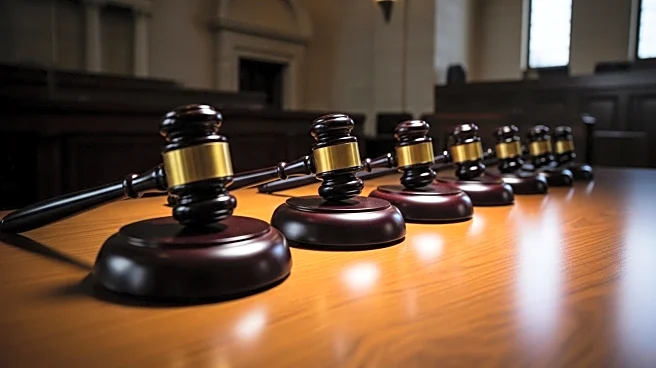What's Happening?
President Trump's decision to deploy National Guard troops in Portland, Oregon, and Chicago is currently facing legal scrutiny in federal courts. The legal arguments are centered around the presidential authority to deploy federal troops on American soil. In Chicago, a federal judge is considering a ban on the deployment of National Guard troops from Texas and Illinois, while in Portland, the 9th Circuit Court of Appeals is reviewing a similar ban. The deployments are intended to address protests and violence, with troops federalized for immigration enforcement. However, local officials have expressed strong disagreement, and the troops have not yet been deployed on the streets due to ongoing legal battles.
Why It's Important?
The legal challenges to President Trump's National Guard deployments highlight significant questions about the limits of presidential power. These cases could set precedents for future decisions regarding the use of federal troops within the United States. The outcome may impact public policy and the balance of power between federal and state authorities. The broader implications extend to other legal cases involving presidential authority, such as sanctions and immunity, which are increasingly being addressed by the Supreme Court. Stakeholders, including local governments and civil rights groups, are closely monitoring the situation, as it could affect the handling of protests and immigration enforcement.
What's Next?
The federal judges involved in these cases are expected to take their time to deliberate the arguments presented. Legal experts anticipate a decision within the next 24 to 48 hours, although the outcome is likely to be appealed by either side. The ongoing legal proceedings will continue to explore the extent of presidential authority, potentially influencing future cases and Supreme Court decisions. The situation remains fluid, with potential implications for the deployment of federal troops and the enforcement of immigration policies.
Beyond the Headlines
The legal battles over National Guard deployments may have deeper implications for civil liberties and the role of federal authority in local matters. The cases could influence public perception of government intervention in protests and civil unrest, raising ethical and legal questions about the balance between security and individual rights. Long-term shifts in the interpretation of presidential power could emerge, affecting how future administrations approach similar situations.










